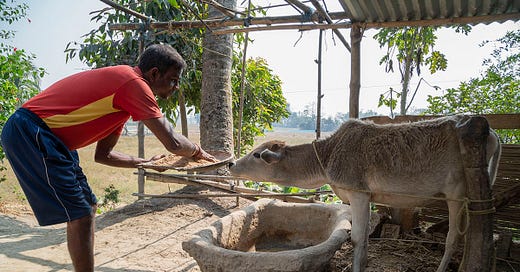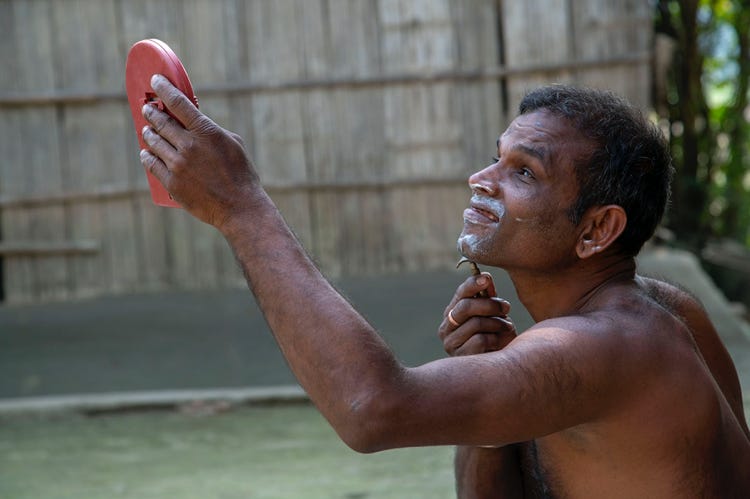Namaste! Welcome, all new subscribers! I’m Priti Salian, the author of Reframing Disability, your fortnightly dispatch simplifying disability inclusion for content creators.
In this eleventh issue, hear from CK Meena, the editor of Everyone Is Good At Something, find an explainer on inspiration porn, a groundbreaking ad campaign, quick tips for making your online meeting accessible for neurodivergent people, an invitation to join a global community, and things to do over the weekend.
First, a quick poll:
What can I add/remove/change to make this newsletter better for you? Respond to this as a reply to this email.
A one-of-a-kind campaign
Reframing Disability has discussed the need and reasons for publishing the stories of the everyday lives of disabled people earlier. Without making them sound like “inspiration porn” (explanation below) or full of pity for persons with disabilities, of course. In this issue, I’d like to introduce to you an Indian campaign doing just that.
Everyone Is Good At Something (EGS) is a repository of the everyday lives of individuals with disabilities in India. Launched in April of 2021 by the India Inclusion Foundation, the purpose of the campaign is to showcase persons with all 21 disabilities as included in India’s Rights of Persons with Disabilities Act, from all 28 states and 8 union territories in India.
Vicky Roy, an award-winning photographer, travels to their homes to meet each person, works magic with his camera, and brings back a bag full of conversations and photos. Interviews are then conducted by the writers, stories written, edited and published every Friday.
Short and crisp reads, EGS’s stories are written in simple language, supported by five stunning photos. Published in six Indian languages including English, EGS’s strength lies in its simplicity and portrayal of the stories of people we rarely see in the media.
Highlighting the beauty and complexity of ordinary life, these stories portray the protagonists’ dreams and aspirations, pursuits of passion and challenges with inaccessibility.
All photos on EGS have alt-text and the website uses the widget “UserWay” for other accessibility features.
Of the 153 stories published so far, one of my favourites is the story of Gobinda, a DeafBlind middle-aged man who expertly navigates outsiders through the shortest routes in his village. (That’s one reason why it’s important not to make assumptions about people with disabilities without knowing them first. More on this after the interview).
Credit: Vicky Roy. Image description: Gobinda, a DeafBlind middle-aged Indian man with short black hair dressed in blue shorts, a red T-shirt and slippers with pink straps, leans towards a tethered white calf, holding a winnow heaped with fodder. With his right hand, he is picking up a handful of mud-coloured fodder, as the calf sniffs at it expectantly. An empty tub of water lies between Gobinda and the calf who is standing under a tin sheet that serves as its shelter. The sun is shining and several trees can be seen in the background in Gobinda’s village.
Credit: Vicky Roy. (This is a bonus photo I got from Vicky). In his interview, Gobinda said, “I shave in front of a mirror although I can’t see it.”
Image Description: Gobinda, a middle-aged DeafBlind Indian man with short black hair is sitting on the ground without a garment on his torso. He is holding up a mirror with a red plastic frame in his left hand. A razor in his right hand runs over his chin as he looks into the mirror and shaves off his facial hair. Shaving cream covers parts of his chin, upper lip region and left ear.
I first met CK Meena, the editor of Everyone Is Good At Something (EGS) at the India Inclusion Summit in Bengaluru in 2022. We connected instantly and have since spent hours chatting about disability inclusion.
Meena has worked for Indian dailies like Deccan Herald and The Hindu. She is a founding member of the Asian College of Journalism, which was originally established in Bengaluru and later moved to Chennai, in TamilNadu. Author of three novels, Meena’s latest The Invisible Majority co-authored with VR Ferose (the founder of the India Inclusion Foundation), is a comprehensive overview of disability in India.
For Reframing Disability, Meena and I chatted about her work with EGS.
What is the purpose of Everyone Is Good At Something’s storytelling?
Quite simply, the aim is to spread awareness about disability. I don't think there is another campaign like ours, where the stories of persons with disabilities come from all corners of the country, from rural and even remote regions, week after week, except when we take one month off around Christmas and New Year. We hope our translations into other Indian languages will make a difference but they have yet to gain a steady readership.
As the editor of EGS and author of The Invisible Majority, have you had any surprising insights about disability?
All my insights about disability were acquired from the time I worked on The Invisible Majority: from the books that my co-author VR Ferose sent me as background reading, from listening to his own thoughts on the subject, from attending the India Inclusion Summit, and naturally from the dozens of people I met over a year of travelling and interviewing PwD, institution builders activists, and young entrepreneurs in the disability field.
That disability will affect all of us at some point in time and therefore should concern all of us was my first mind-altering insight (and the justification for the title ' The Invisible Majority', not Minority).
Another interesting insight I had is the body's amazing ability to adapt. For instance, you lose your arms, and your legs are capable of becoming substitutes. The superior hearing ability of blind people is a well-known fact but I was stunned by how they can decipher the extremely speeded-up screen reader whose speech sounds like gibberish to the average listener.
Since you've been doing this week in and week out for three years, does it get monotonous?
Not in the least. The best part about editing EGS is that I get to vicariously dip into the lives of such a variety of people from different regions and social backgrounds. In my long journalistic career as a feature writer and columnist, I have always been fascinated by people and loved doing profiles and interviews. Each EGS story is different because the focus is not on the disability but on everyday joys and struggles. To bring out a person's inner life, all the courage, humour, pathos, defiance, hope, and a myriad other emotions, and offer it to the reader in an empathetic manner, never fails to engage and absorb me. Each story has a different focus, so there is never any monotony or boredom.
Heard of ‘inspiration porn’?
It’s a commonly used term among people who care about disability inclusion. ABC journalist Stella Young, who was a wheelchair user, coined this term and left us an explanation of the objectification of disabled people.
Don’t applaud people with disabilities to simply exist, Stella said.
Do you find a person without arms painting with her mouth or using her toes to hold a pencil? That’s just the best and the most ‘normal’ way for her to paint or write. “We all learn how to use the bodies we're born with, or learn to use them in an adjusted state, whether those bodies are considered disabled or not,” Stella wrote.
Why should the everyday lives of people with disabilities in which they do exactly the same things as non-disabled people be “inspiring” to others? she asked. Because it’s ‘extraordinary’ for a non-disabled person?
From this idea of disabled people being ‘inspirational’, emerges a lot of reporting. Twelve years ago, Stella wrote what still seems to be true: “Most journalists seem utterly incapable of writing or talking about a person with a disability without using phrases like "overcoming disability", "brave", "suffers from", "defying the odds", "wheelchair bound" or, my personal favourite, "inspirational".”
Perhaps having more stories of the everyday lives of disabled people can bring about a change.
Check out this groundbreaking ad campaign
Self-fulfilling prophecy is a term in social psychology that refers to an expectation or belief that can influence a person’s behaviour, causing the belief to come true. For example, if you believe that a person is not capable of learning football, you might not give them the opportunity and they wouldn’t be able to learn football. Based on this concept, an ad for World Down Syndrome Day (21 March) challenges assumptions about people with Down Syndrome. Watch actor Madison Tevlin demand people to “assume that I can” drink Margarita, live on my own, go to a party, learn Shakespeare, and do several other jobs. The video is available with the narrative description of the visual information.
An invitation to join the Disability Justice Media Network
I run the Disability Justice Media Network (DJMN) for the Disability Justice Project, an initiative that trains human rights defenders with disabilities in Asia, Africa and the Pacific in documentary storytelling. DJMN began as a WhatsApp group of DJP’s fellow alumni a year ago. Later last year, we decided to expand it by inviting journalists and media creators across the world who are interested in disability inclusion. Soon after, I happened to attend the fabulous Splice Beta media festival in Chiang Mai. When I introduced the idea of this group to Beta attendees, I found a completely new-to-me community of folx interested in this work. Today, our group has disabled and non-disabled members from over a dozen countries, working in the media in different roles, for varied audiences, with expertise in diverse subjects. Not everyone is involved in disability-centred content, but they are in the group to learn and share. DJMN is growing with the needs of its members. Would you like to contribute, learn and be a part of this community? It’s a safe space, I promise! Hit reply or write to me at psalian@disabilityjusticeproject.org if you’d like to join this group.
Accessibility tip of the fortnight
There are dozens of simple tips for making online meetings accessible to neurodivergent people. Today, I’ll share a few. Ask yourself these four questions while planning an online meeting.
1. Did you send out a clear outline of the agenda of your online meetings in advance to the participants?
2. Did you prepare a structured programme of your meeting and will read it out before you start?
3. Does this structured programme include the names of the speakers and the time designated to each?
4. Does it include house rules such as raising your hand to ask a question or putting your questions in the chat?
Things to do over the weekend
Walking Tour: “Stories Against Stigma”
Join this walking tour by the National Institute of Mental Health and Neurosciences (NIMHANS) in Bengaluru on 6th April 2024. Staff will take you around to see the work of the institute and the initiatives it has taken to destigmatise mental health.
“What if Little Red Riding Hood was deaf? What if the Ugly Duckling was an autistic swan?” In a new book by the NGO Rising Flame, 13 disabled women retell fairy tales by weaving in their own everyday experiences, struggles, joys and frustrations into them. And They Lived…Ever After might challenge your perceptions of classic tales and disability.
A big thank you!
Award-winning journalist Sham Jaff of Bonn Institute interviewed me for the organisation’s newsletter recently. I’m humbled and honoured! Thank you, Sham, for featuring me and Reframing Disability.
Sham has been part of the newsletter industry for a decade and runs the newsletter whathappenedlastweek.com in which she curates news from Africa, Asia and Latin America and simplifies it with context. Subscribe, it’s well worth your time.
That’s it for today. Reply to this email with your thoughts on today’s content or anything else at all. Connect with me on LinkedIn and Twitter!
Warmly,
Priti
Forward Reframing Disability to a friend if you think it would be worth their time.





